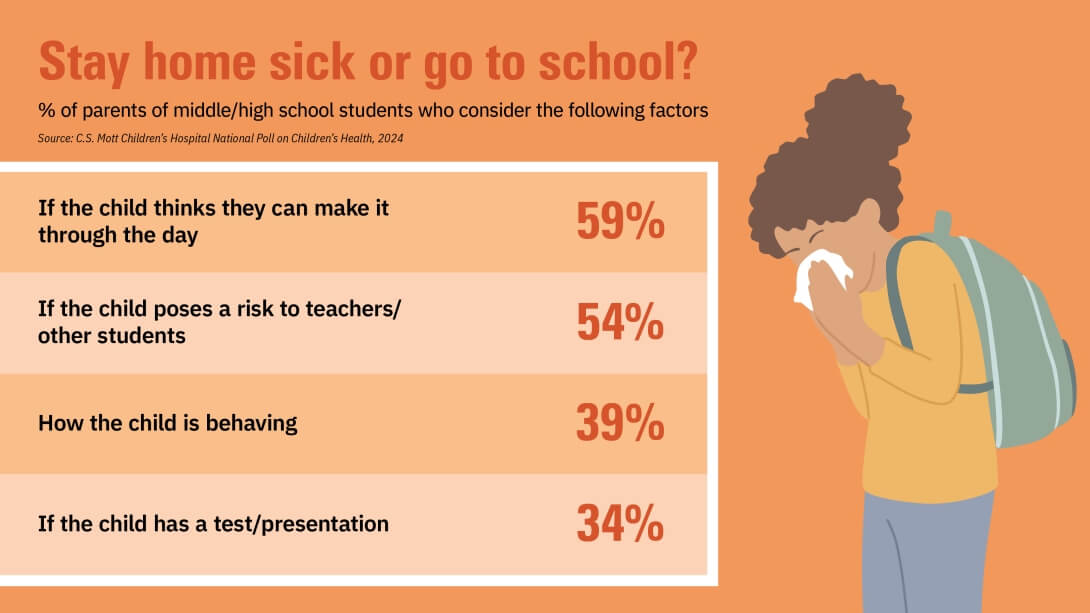ANN ARBOR, Mich. — Whatever happened to playing hooky? According to a new survey from University of Michigan Health, close to two-thirds of U.S. adolescents and teens worry about how staying home sick from school will affect their grades, extracurricular activities, or social status. It isn’t just the kids, though. The survey also reveals that many moms and dads are struggling right now when it comes to deciding whether their middle or high school-aged children should stay home from school if they don’t feel well.
According to the C.S. Mott Children’s Hospital National Poll on Children’s Health, the top factors parents say they consider when making school attendance decisions include how their adolescent or teen is behaving due to their symptoms, if they can get through a school day, the risk that they’re contagious, and whether the student will miss a test, presentation, or after school activity.
Meanwhile, one in five parents say they also routinely consider if their child needs a mental health day. This nationally representative survey was held in February 2024 and was based on 1,300 responses from parents of children ages 11 through 18.
“In some cases, the decision to keep kids home from school is clear, such as if the child is vomiting or has a high fever,” says Mott Poll co-director Sarah Clark, M.P.H., in a media release. “But parents often have to guess at whether their child’s report of ‘not feeling well’ represents a good reason to miss school.”
Over half of the parents note they’re more likely to keep their kids at home if they are unsure of the seriousness of their child’s illness. Meanwhile, a quarter add they would send their child to school in that scenario while simply “hoping for the best,” and less than a fifth would let their child decide.
Generally speaking, grades tend to become more important to kids as they mature into adolescents and teens in junior high and high school. So, around this age many parents include academic considerations in their sick day decision-making process. As mentioned earlier, close to two-thirds report their child usually worries about how an absence may negatively impact their grades, friendships, or school activities.
Clark believes parents should ask more questions in order to learn about their child’s request to stay home. If it’s on the day of a test, she continues, it may reflect a lack of preparation or just general anxiety about the exam.

It may sound strange to older generations, but modern parents increasingly recognize the mental health needs of their children; 19 percent say they’re at least open to allowing their child to take a mental health day. Clark notes that in some cases, face-to-face interactions may trigger or exacerbate mental health issues. Examples include a breakup with a romantic partner, a falling out with friends, or an embarrassing incident shared on social media.
“It’s understandable that students may fear facing peers in uncomfortable social situations, but they can’t miss school every time they expect an unpleasant interaction,” Clark adds. “Facing discomfort is a natural part of life, and parents play an important role in helping kids to learn how to navigate these challenges in order to build resilience and develop healthy strategies for handling social stressors.”
Clark comments that parents may want to consider the underlying purpose of a mental health day away from school; it could serve as an opportunity to help the child plan how to handle interactions, practice strategies to stay calm and ease anxiety, or identify specific peers, teachers, or staff who can provide support.
For adolescents diagnosed with depression or anxiety, missing school may be necessary to sustain the child’s well-being, researchers say. Ultimately, parents must consult with their child’s mental health provider for guidance.
Close to all surveyed parents report their school has an attendance policy, which they feel is necessary to ensure children go to school consistently. The majority of parents also believe the amount and timeframe for making up missed schoolwork is reasonable. However, many parents simultaneously acknowledge that compliance with school attendance policies can be especially challenging for children with chronic medical conditions who have to miss school due to medical visits and/or to avoid exacerbating their condition.
“Parents agreed that attendance policies are important to preventing truancy or excessive absenteeism linked to poor school performance,” Clark concludes.
“However, parents of children with health issues that require traveling to regular appointments and even hospitalizations may need to have conversations with school administrators and teachers about the likelihood of health related absences. These families may need to enlist the child’s healthcare providers for support in requesting school flexibility in completing assignments at home or with additional time.”
